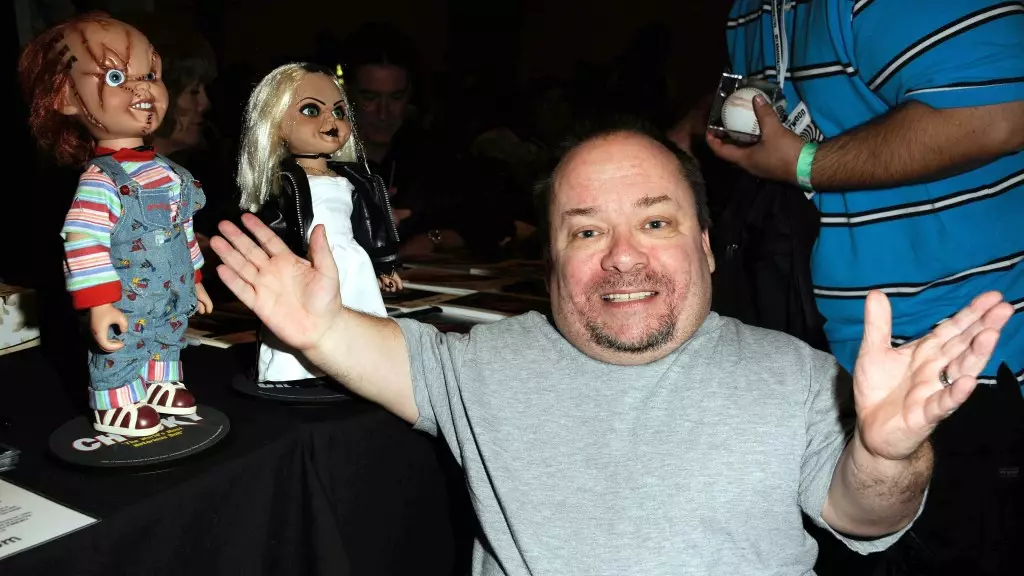Ed Gale was not just another name on the screen; he was a figure whose presence brought life to an array of characters that danced through the realms of fantasy and horror. Known for his detective antics in the cult classic “Child’s Play,” as well as the misfit hero in “Howard the Duck,” Gale enjoyed a career marked by comedic timing and the charm of a performer who was willing to put himself out there, regardless of the odds against him. However, the recent news of his passing at the age of 61 has elicited a poignant juxtaposition of mournful memories and unsettling revelations. While fans reflect on the joy he spread through his performances, a darker undertone shadows the narrative, highlighting a jagged complexity that demands deeper contemplation.
Tributes and Personal Memory amidst Grief
The immediate reaction to Gale’s death was filled with touching tributes, particularly from his niece Kayse, who painted a picture of a man who was not only an entertainer but also an enthusiastic uncle who relished sharing the lure of Hollywood with his family. Kayse’s heartfelt remembrance captured the eccentricities described in a light that radiated love and warmth, recounting how her uncle had mixed a cocktail of humor, childhood nostalgia, and an unabashed enthusiasm for life. Yet, in wrestling with the opinions of those mourning, one cannot simply slide past the disquieting facts that marred his later years. While the celebratory tone of remembrance is heartfelt, it also flirts vacantly with the discomfort of knowing Gale faced severe legal controversies just before his death, raising questions about how society should reconcile with the icons we choose to idolize.
The Disturbing Revelation
Amidst the tributes and nostalgia lies an unsettling truth: Gale had been embroiled in scandal surrounding soliciting minors for sexual acts, a fact that starkly contrasts with his public persona. This troubling revelation cannot be disregarded; it serves as a potent reminder that often the very artists we celebrate can lead lives shrouded in darkness, reminding us of the complexities of human existence. Society tends to compartmentalize the contributions of celebrated figures while overlooking their moral culpability, but does that compartmentalization serve to perpetuate a harmful legacy?
Furthermore, there arises a fundamental question about accountability, particularly for figures basking in the limelight. It becomes difficult to celebrate a man’s achievements when they are juxtaposed against heinous behavior that betrays the trust of society. The contrast between his jovial on-screen roles and the deeply troubling allegations begs for us to reconsider how we assign worth to artistic accomplishments. Is talent sufficient justification for overlooking misconduct, particularly when that misconduct involves the most vulnerable members of society?
Culture and the Facade of Stardom
Gale’s case forces us to reassess the often romanticized notion of stardom—a world crafted from glamour and success but precariously balanced atop ethical dilemmas. As a performer who overcame personal challenges and delighted audiences, Gale inhabited a space that many could only dream of. Yet, with every story shared about his charm and comedic prowess, there is an urgent need to confront the allegations that punctuate his biography.
Are we, as a culture, willing to admit that the narrative of the flawed artist is a recurring theme tangled within the fabric of our entertainment industry? The adoration for icons often emboldens them to escape critical scrutiny, trapping the audience in a cycle of reverence. Only through a realistic examination of both the art and the artist can we hope to foster a more transparent appreciation of those we celebrate.
Ultimately, as we navigate the murky waters of mourning Ed Gale’s passing, we must face the uncomfortable truth that acknowledging his legacy compels us to also grapple with the disarray left in its wake. It asks of fans, creators, and society at large to create a dialogue centered around the need for accountability, providing an opportunity to redefine our relationship between art and ethics. This tragic mingling of loss and revelation serves as a powerful reminder that the joys of legacy must coexist with the responsibilities of truth.

Leave a Reply